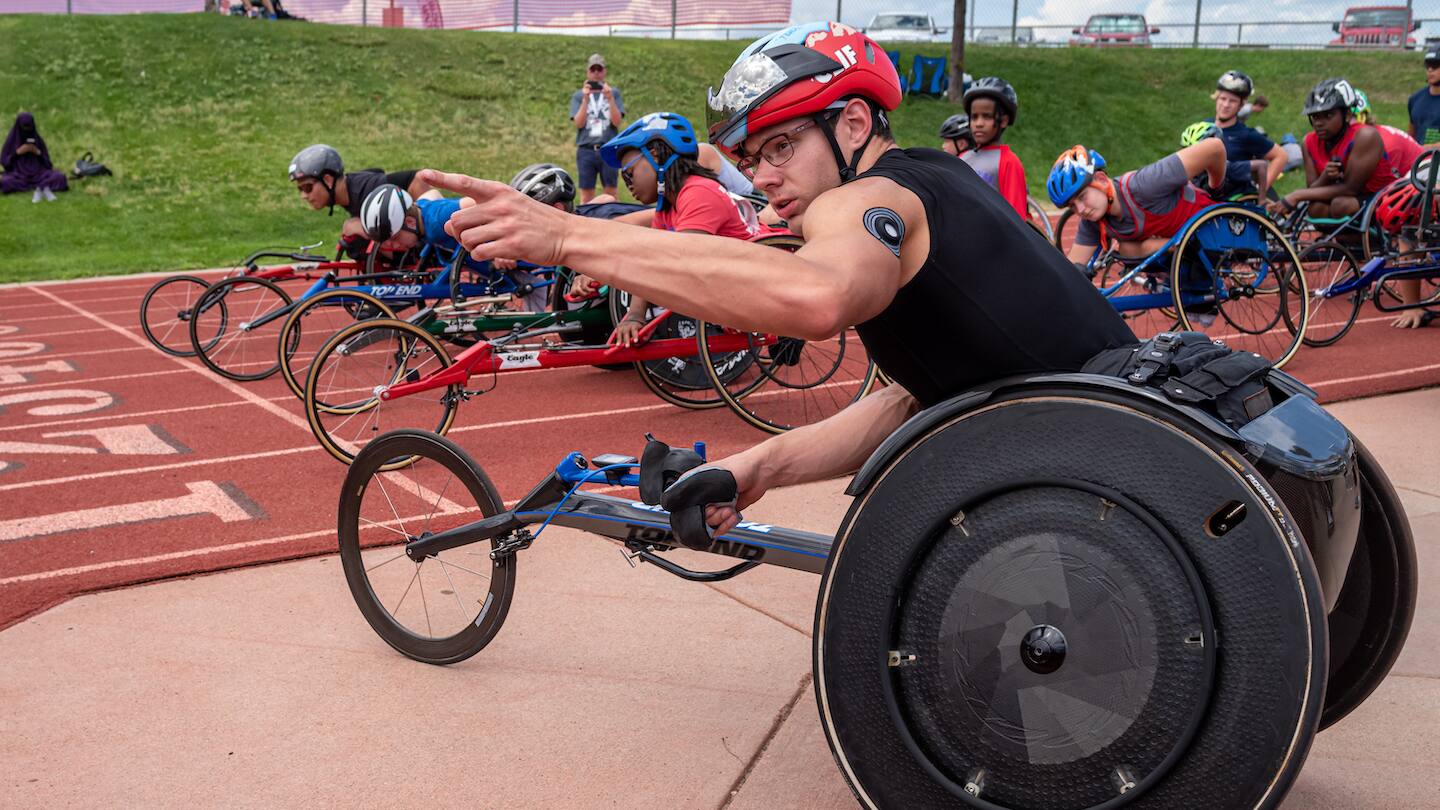
Move United Junior Nationals Showcase Talent And Kindness
by Ryan Wilson

Daniel Romanchuk coaches young wheelchair racers at the Move United Junior Nationals. (Photo: Move United)
After Amanda McGrory finished registering athletes and organizing medals at this year’s Move United Junior Nationals, she took to the track and challenged up-and-coming athletes to a race.
No, McGrory was not competing. She wanted to see if anyone was fast enough to beat Daniel Romanchuk in scorching temperatures.
“I’m not sure how much (Daniel) truly appreciated it in the end, because my brilliant idea was to offer anyone who beat him off the starting line $100,” McGrory said. “He ran about 20 starts in 95-degree heat at noon.
“I told him if he didn’t win, we were going to have a serious chat about it.”
McGrory, Romanchuk and many other former University of Illinois teammates helped out with the track and field portion of this year’s Move United Junior Nationals, which took place from July 16-22 near Denver and showcased more than 300 of the top adaptive athletes under 23 years of age.
McGrory has volunteered at the event for several years, and she was responsible for ensuring registration went smoothly in an air-conditioned hotel.
Romanchuk did not get the luxury of the air conditioning. He was outside most days, facilitating sessions on drafting and starts. He also gravitated toward tents constructed for the independent athletes, the athletes who are not associated with a team, and answered their questions about travel, practice, his daily routine, and proper equipment and maintenance.
It didn’t hurt that Romanchuk’s mother, Kim, had planned out several talking points in advance.
“I would not have been able to do all of that without her,” Daniel Romanchuk said. “She definitely helped organize everything. … She had bags that had various pieces of equipment.”
Daniel and his mom came up with the idea of offering scholarships to help the independent athletes pay for travel to Colorado. They gave 30-plus athletes $100 scholarships, and an anonymous donor assisted the athletes who did not receive support from Romanchuk.
“There’s a lot to juggle with going to Junior Nationals, especially as an independent athlete,” Romanchuk said.
McGrory has noticed the event grow over the years, and she is glad more of the younger generations are getting involved with sport.
“A lot of kids, at least the ones I have talked with, have gotten into athletics to find that community that they're kind of missing in the non-disabled world,” she said. “There’s something special you get from being able to interact with people who look like you; experience the world like you; have some of those shared experiences and can relate to you in a way that your non-disabled peers can’t. That was huge for me when I started competing.”
McGrory first got involved in adaptive sports in the 90s in Philadelphia. She had limited opportunities to learn about sports for kids with disabilities, but she recalls looking up to Jessica Cloy at her first junior nationals. Cloy also attended the University of Illinois.
“When I started racing, going to my first junior nationals, it was Jessi Galli, who is now Jessi Cloy,” McGrory said. “It was my friend Jessica who was just like ‘it.’ Part of the reason we didn’t become friends until college … was because I was far too intimidated by her to ever speak to her.”
Romanchuk, too, remembers the older, more experienced racers giving back when he first started in adaptive sports in Baltimore. Athletes would come back and share their life experiences with the Bennett Blazers, the first adaptive sports program with which Romanchuk was affiliated.
“I remember growing up, the people who had gone through the program and had graduated out of my youth program, I remember them coming back … and they taught us about the sport and showed us what was possible in life,” Romanchuk, now one of the fastest wheelchair racers in the world, said. “I think it’s a really impactful thing, and I’m glad to be able to do that.”
McGrory retired from Paralympic sports after the Tokyo 2020 Games. She no longer has her racing chairs, but she enjoys helping where she can.
At junior nationals, she saw athletes still learning the basics of racing, and others already picking up on more advanced tactics in the sport.
McGrory enjoys seeing the sense of community created through adaptive sport and seeing current athletes giving back.
“It’s really cool to be a part of that entire experience, and it’s also cool to see some of the older, more experienced athletes kind of just instinctually taking the younger ones and the less experienced athletes under their wings and helping them out.”
Ryan Wilson is a freelance contributor to USParaTrackandField.org on behalf of Red Line Editorial, Inc.